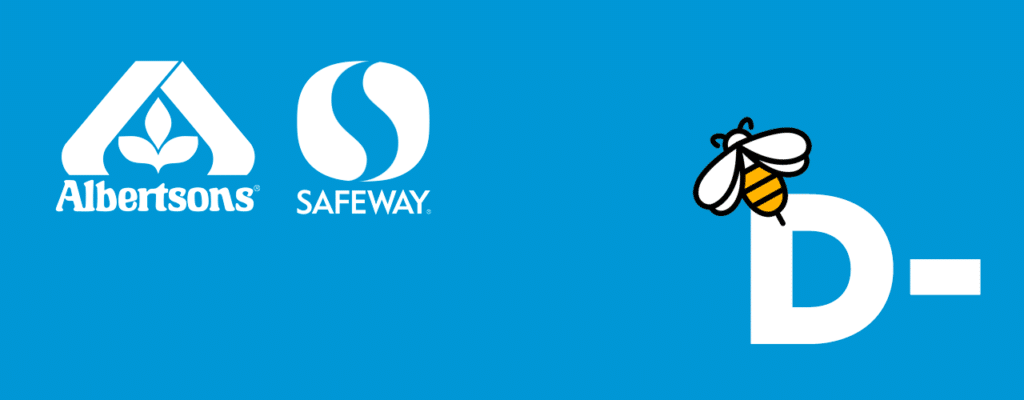
Albertsons
Summary of Albertsons grade

Pollinator Health Policy
18 out of 45 points
In February 2020, Albertsons revised the company Supplier Sustainability Guidelines & Expectations for own brand products to include pollinator health policy language. The guidance identifies the following pesticides as targets for reduction: neonicotinoids, chlorpyrifos, and pesticides on the California Prop 65 list of chemicals that can cause cancer, birth defects or other reproductive harm, which includes glyphosate. The guidance encourages use of alternative approaches, including integrated pest management. The guidance also encourages suppliers to avoid regrettable substitution (the replacement of one hazardous pesticide with another) and includes a link to a list of possible regrettable substitutes. Albertsons’ 2018 annual report states a commitment to continue to increase organic offerings.
Albertsons’ guidance on pollinator health does not include any timebound or measurable commitments to phase out pesticides of concern or expand the adoption of least-toxic practices in company food or beverage supply chains.
Commitment to reduce pesticide use
7 out of 15 points
Avoiding regrettable substitutes
5 out of 5 points
Commitment to least-toxic approaches in non-organic supply chains
1 out of 10 points
Commitment to organic
5 out of 15 points

Implementation
0 out of 90 points
Albertsons has not taken any discernible action to reduce use of pesticides of concern to pollinator and human health or expand organic farming and other least-toxic approaches in its supply chains. The actions we evaluated include: 1) tracking use of pesticides in company supply chains, 2) measurably reducing pesticide use in the past three years and publicly reporting on data, 3) supporting farmers in non-organic supply chains to shift to least-toxic approaches such as integrated pest management and regenerative agriculture, 4) measurably expanding organic offerings in the past three years, 5) demonstrating support for U.S. growers to transition to organic farming, and 6) demonstrating advocacy for public policies aimed at reducing agricultural pesticide use, protecting pollinators and supporting the expansion of organic agriculture in the U.S.
Track pesticide use in supply chain
0 out of 10 points
Measurably reduce pesticide use
0 out of 15 points
Prioritize least-toxic approaches in non-organic supply chains
0 out of 20 points
Prioritize USDA certified organic
0 out of 25 points
Support domestic organic growers
0 out of 15 points
Support public policies
0 out of 5 points

Transparency & Accountability
8 out of 21 points
Albertsons has a written, publicly available pollinator health policy in the company Supplier Sustainability Guidelines & Expectations.Albertsons has a publicly available commitment to expand offerings in its 2018 annual report. Albertsons educates consumers by clearly defining the organic label on its website stating: “All O Organics products are USDA certified organic which means the products were grown in environmentally friendly ways that help to conserve biodiversity, promote ecological balance, and protect natural resources. This ensures that least 95% of the ingredients in each O Organics product are produced without the use of synthetic pesticides, fertilizers, antibiotics, added growth hormones or Genetically Modified Organisms (GMOs).”
Albertsons does not appear to include reduction of pesticides of concern to pollinators and human health or expansion of organic offerings in company Key Performance Indicators or other formal sustainability criteria. Albertsons does not have educational content online on the value to pollinator and human health of decreasing use of toxic pesticides and expanding organic offerings.
Make policies and commitments publicly available
6 out of 6 points
Oversight
0 out of 5 points
Educate consumers
2 out of 10 points

Collaboration
0 out of 10 points
Albertsons has not communicated with Friends of the Earth in the past year. Albertsons has not briefed Friends of the Earth on meaningful action the company has taken on pesticides and pollinator protection in the past three years.

Complimentary Home & Garden Policies
0 out of 9 points
Albertsons has not made a public commitment to reduce or phase out use of neonicotinoids in live goods and garden plants. Albertsons has not made a public commitment to remove neonicotinoid or glyphosate products from store shelves.
Policy for live goods
0 out of 4 points
Policy for on-shelf pesticide products
0 out of 5 points

Bonus Points
0 out of 40 points
26 Points
D-
grade